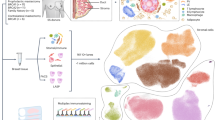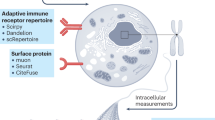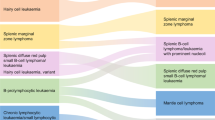Abstract
HUMAN lymphoblastoid cell lines derived from the peripheral blood lymphocytes of healthy donors are commonly diploid when examined in the early months after establishment but acquire chromosome abnormalities on prolonged culture. Other lines, notably those derived from Burkitt's lymphoma tissue, may display chromosome aberrations from the outset1–5. A partial translocation 8q−14q+ has been demonstrated in the majority of Burkitt lymphoma-derived lines5,6 and data on the karyotypes of some human tumours suggest that non-random gains and/or losses of chromosomes may be a feature, in particular, of certain leukaemias and lymphomas7–13. As the emergence of an aneuploid clone from a previously diploid lymphoblastoid line may be associated with other changes suggesting the development of a more ‘malignant’ phenotype14, it is relevant to compare the chromosome aberrations detected in such lines with the human tumour data. We have therefore undertaken a study of banded karyotypes of eighty EB virus-carrying human lymphoblastoid lines. The first stage of this analysis is concerned only with gains and losses of whole chromosomes or chromosome arms and the data presented here establish that, considering all the lines together, there have been nonrandom gains of five autosomes (numbers 3, 7, 8, 9 and 12) and of the sex chromosomes.
This is a preview of subscription content, access via your institution
Access options
Subscribe to this journal
Receive 51 print issues and online access
$199.00 per year
only $3.90 per issue
Buy this article
- Purchase on Springer Link
- Instant access to full article PDF
Prices may be subject to local taxes which are calculated during checkout
Similar content being viewed by others
References
Nadkarni, J. S. et al. Cancer 23, 64 (1969).
Macek, M. et al. Cancer Res. 31, 308 (1971).
Steel, C. M., McBeath, S. E. & O'Riordan, M. L. J. natn. Cancer Inst. 47, 1203 (1971).
Bloom, A. D., McNeill, J. A. & Nakamura, F. T. in Chromosomes and Cancer 565 (ed. German, J.) (Wiley, New York, London, Sydney and Toronto, 1974).
Zech, L., Haglund, U., Nilsson, K. & Klein, G. Int. J. Cancer 17, 47 (1976).
Manolov, G. & Manolova, Y. Nature 237, 33 (1972).
Fleischman, E. W., Hakansson, C. H., Levan, A. & Moller, T. Hereditas 70, 243 (1972).
McCulloch, P. B., Dent, O. B., Hayes, P. R. & Liao, S. K. Cancer Res. 36, 398 (1976).
Rowley, J. D. Proc. natn. Acad. Sci, U.S.A. 72, 152 (1975).
Mitelman, F., Levan, G., Nilsson, O. G. & Brandt, L. Int. J. Cancer 18, 24 (1976).
Rowley, J. D. Cancer 36, 1748 (1975).
Mitelman, F. & Levan, G. Hereditas 82, 167 (1976).
Mark, J. Adv. Cancer Res. 24, 165 (1977).
Nilsson, K. Haematology Blood Transfusion 20, 253 (1977).
Steel, C. M. Nature 233, 555 (1971).
Author information
Authors and Affiliations
Rights and permissions
About this article
Cite this article
STEEL, C., WOODWARD, M., DAVIDSON, C. et al. Non-random chromosome gains in human lymphoblastoid cell lines. Nature 270, 349–351 (1977). https://doi.org/10.1038/270349a0
Received:
Accepted:
Issue Date:
DOI: https://doi.org/10.1038/270349a0
This article is cited by
-
In vitro culture of B-lymphocytes derived from epstein-barr-virus-associated posttransplant lymphoproliferative disease: Cytokine production and effect of interferon-alpha
In Vitro Cellular & Developmental Biology - Animal (1997)
-
Morphologic and immunophenotypic characterization of a cell line derived from liver tissue with epstein-barr virus associated post-transplant lymphoproliferative disease
In Vitro Cellular & Developmental Biology - Animal (1994)
-
Thymidylate metabolism in fragile X syndrome cells
Somatic Cell and Molecular Genetics (1985)
-
Epstein-Barr virus (EBV), lymphocytes and transformation
Journal of Cancer Research and Clinical Oncology (1983)
-
Translocation 8;14 in an ataxia telangiectasia-derived cell line
Nature (1979)
Comments
By submitting a comment you agree to abide by our Terms and Community Guidelines. If you find something abusive or that does not comply with our terms or guidelines please flag it as inappropriate.



